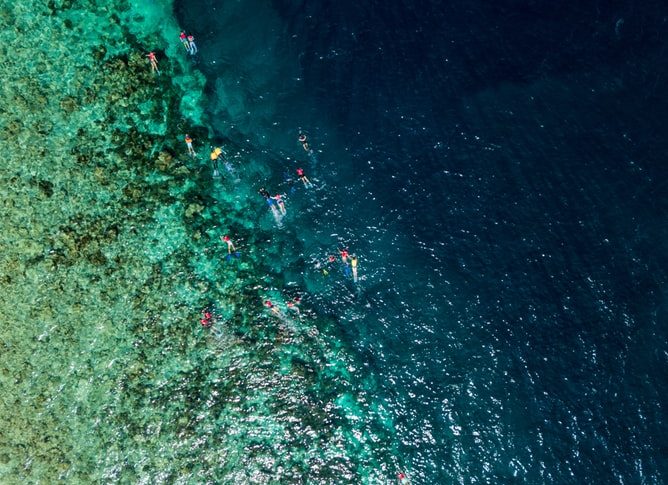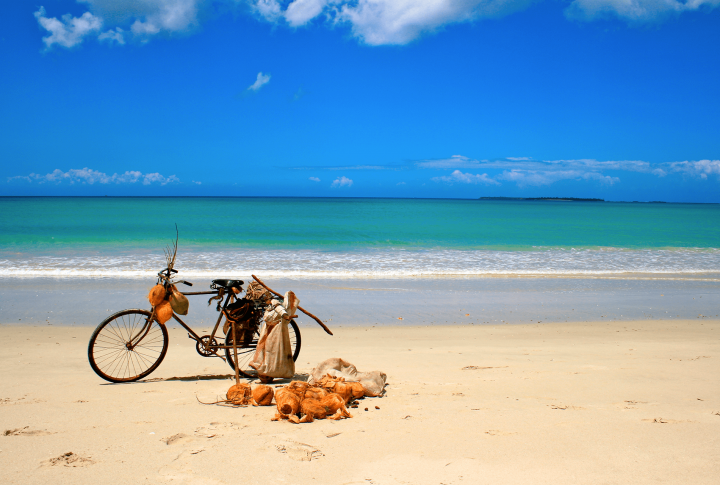
AN INSIGHT INTO CORAL REEF
According to the Department of Fisheries and Marine Resources of Zanzibar (2009) [https://www.scuba-do-zanzibar.com/MCAsZanzibar.pdf], there are five marine conservation areas around Zanzibar Island. Coral Reef is very often called the underwater gold as it generates enormous amount of money, among others in fisheries, tourism or medicine industry.
Initiative Française sur les Récifs Coralliens (IFRECOR) – 2018 [https://www.iyor2018.org/wp-content/uploads/2017/12/Plaquette-ValoEco_Synthese-EN-web.pdf] – claims that coral reefs, together with sea grass beds and mangrove forests, make a 1.3 billion EUR annual income only in case of nine French overseas territories. Hence, it is very important to protect corals not only for their beauty, but also for the economic value.
To enable You a full experience combined with sustainability rules, here is what we would like to kindly suggest You when it comes to snorkeling or diving in the area of coral reef:
-
- Leave all unnecessary things before getting into the water, like jewelry, headbands, etc. You definitely won’t need them there, and in case of loss, You will be upset and the environment will gain another unnecessary object that will become a trash.
- Does Your sunscreen contain oxybenzone? You’ll do the corals a big favour if You will use a sunblock that doesn’t contain this ingredient. Studies conducted by the group of researchers (C. A. Downs et al., 2015) proved that oxybenzone is very harmful to the coral reef, causing its bleaching and eventually – death. Just a small size – 62 parts per trillion of oxybenzone is toxic to corals and cause lethal consequences. To give You a clear picture, this is an equivalent to a drop of water in six and a half Olympic-sized swimming pools (Downs C. et al., 2015) [http://www.haereticus-lab.org/wp-content/uploads/2017/03/October-20.2015-Press-Release.pdf]. Mary Jo Dilonardo(2019) [https://www.mnn.com/earth-matters/wilderness-resources/stories/how-your-sunscreen-could-hurt-coral-reefs] claims that the aerosol sunscreens are the worst, as they are being spread in the water and air, what enables chemicals to travel long distances. Hence, from a big variety of sunscreens, choose one that does not contain oxybenzone and is not a spray.
- Coral reefs are beautiful underwater gardens. As most of the plants, corals are very sensitive and fragile. If You step on the flower, it may be destroyed, but will probably grow back in a few months or the next year. If You step on the coral, it may take minimum 10 years or much more to recover (and this would be possible only in very favourable conditions). Let’s save those super sensitive gardens and avoid stepping or touching them at all costs.
- Not littering in the area of corals is needless to say (we hope!). At the same time, we would like to assume that getting to know this natural and very fragile ecosystem will sensitize You to the waste management issue on a larger scale (smaller consumption, proper waste disposal, using more environmentally friendly chemicals or exchanging them for natural cosmetics and cleaning supplies, etc.). The way how You live at home on everyday basis, even thousands kilometres away from the reefs, affects them.
- Keep Your distance (at least one metre safety zone) from corals and marine life. Pay special attention to Your equipment (fins, sports cameras, etc.) to not strike coral with it. Taking an ‘epic photo’ will not justify any damage to the coral reef or its inhabitants.
- Would You like to come back and spend some more time for admiration of those underwater gardens? Perhaps You would like to show this amazing world to Your family and friends? Take nothing but thousands of pictures and videos – the only acceptable souvenirs – and You may be able to come back and enjoy the reef in its abundance.
- No matter if You want to take awesome pictures or just interact with sea life, DO NOT FEED THE ANIMALS. Firstly, the food You give may be harmful to some of them (what is good for one, may not be good for the other). Secondly, You will teach them non desirable behaviour, e.g. aggressive expectation to be fed by divers or swimmers, disturbing proper food-chain instinct. If You will move slowly in the water, You will surely be able to observe all the aquatic animals around You.
- If You see harmful behaviour of other swimmer, snorkeler or diver – even instructor or guide – don’t be shy to explain them why this kind of action is undesirable and tell them about long-term benefits from keeping the coral reef ecosystem safe and sound (if intrisic value is not enough for them, mention the economic value of corals that we wrote about in the beginning of this text).
- If You will notice any trash in the water, try to collect it if possible. This will help the reef, save some of the aquatic animals (e.g. tortoisessea turtles) and provide You with cleaner and nicer views. After all, as Ghandi said, ‘Be the change you want to see in the world’.
- Enjoy Your underwater journey and make sure You have done everything to protect this marvellous and unique ecosystem, so that You will be able to visit it again.





